Bradley Byrne: Impeachment lessons from the distant past

The first true test of the Legislative branch’s impeachment powers occurred over two centuries ago in 1805. Its parallels with the current impeachment process, and the important precedent it set for determining impeachable conduct, make it worth examining today. That long-ago impeachment battle was waged against Samuel Chase of Maryland, a justice of the United States Supreme Court. The episode is a stern warning against the use of the power of impeachment for political purposes. In 1804, President Thomas Jefferson resoundingly won reelection, and his Democratic-Republican party won large majorities in both the House and the Senate. With his control over the Executive and Legislative branches secure, Jefferson looked to the third branch – the Judiciary. The Supreme Court, comprised at that time of only seven justices, consisted primarily of appointees of George Washington and John Adams, both members of the opposing Federalist party. Jefferson had been angered by several Supreme Court rulings and considered the court an obstacle to his political agenda. He resolved to remove that obstacle. Jefferson saw Chase, an unabashed Federalist appointed by Washington, as the justice most vulnerable to being removed by a partisan impeachment. Jefferson and his allies blamed Chase’s partisanship for several of his rulings against Jefferson. They claimed this conduct was worthy of impeachment. However, what some of Chase’s opponents considered “judicial excesses” weren’t the real issue. Chase’s partisan leanings were merely a convenient excuse to eliminate an obstacle to the Democratic-Republicans’ unchecked political power. Our Founders warned against falling into the trap of impeachment over partisan squabbles. In the Federalist Papers, Alexander Hamilton warned of the “danger that the decision will be regulated more by the comparative strength of parties, than by the real demonstrations of innocence or guilt.” Therefore, the Constitution makes clear that the only impeachable offenses are “Treason, Bribery, or other high Crimes and Misdemeanors.” Did this disagreement on policy grounds rise to an impeachable offense? Nevertheless, with Jefferson’s directive, the House impeached Justice Chase on a party-line vote in a partisan show eerily reminiscent of today’s episode. It would be in the Senate, where Chase’s trial was to take place, where the Democratic-Republicans’ political motivations would come to a head with the Founders’ intentions. Some partisans would ignore the intent of our Founders. Senator William Giles of Virginia said impeachment is “nothing more than inquiry, by the two Houses of Congress, whether the office of any public official might not be better filled by another.” Of course, that contradicts what the Constitution clearly says about impeachment. Yet Chase’s opponents would leave no stone unturned in seeking a charge to stick as an impeachable offense. One of his defenders said Chase’s “footsteps are hunted from place to place, to find indiscretions, which may be exaggerated into crimes.” Does this sound familiar? Those Senators were keenly aware of the important precedent at stake. Most realized that whatever short-term political gains they might achieve would pale in comparison to the lasting detriment to our young nation if the Constitution and its separation of powers were to be undermined. Ultimately, after great deliberation, the Senate acquitted Chase, even with the Senate’s 24 Democratic-Republicans outnumbering its nine Federalists. Despite lacking evidence of an impeachable offense, Democrats have gone too far towards impeaching President Donald Trump to turn back. Never mind that only months ago, Speaker Pelosi said “impeachment is so divisive to the country that unless there’s something so compelling and overwhelming and bipartisan, I don’t think we should go down that path because it divides the country.” Just like in 1805, one party seeks impeachment to gain political power. This time, a president is targeted. This poses a great threat to our Republic, and I’ll continue fighting hard to stop this scheme and protect our Constitution.
‘Rosa Parks Day’ approved by Senate committee, moves to full Senate

On Tuesday, the Senate Governmental Affairs Committee approved a bill which designates December 1 as “Rosa Parks Day” in Alabama. The bill, SB365, sponsored by Mobile-Democrat State Sen. Vivian Davis Figures, moves to the ful Senate. Montgomery Police arrested Parks on Dec. 1, 1955 when she refused to give her seat to a white bus passenger. Parks’ arrest set the Montgomery Bus Boycott into motion, a boycott which is now seen as a catalyst for the Civil Rights Movement. Parks received the Presidential Medal of Freedom and Congressional Gold Medal during her lifetime. She died in 2005, at the age of 92. Rosa Parks Day is already celebrated on December 1 in Ohio and Oregon while California and Missouri celebrate the holiday on her birthday, February 4th. However, the bill does not make the day a state holiday but gives counties and cities the option of declaring Dec. 1 a local holiday. Huntsville-Democrat Rep. Laura Hall, who filed a similar bill in the House last month, stated that in order to avoid debates over cost, they are not pushing to make the day a full state holiday. According to the Montgomery Advertiser, Alabama officially recognizes 15 legal holidays, though six of them share a date with another one. Martin Luther King Jr. and Robert E. Lee‘s birthday are observed on the same day in January. Presidents Day in the state marks the births of George Washington and Thomas Jefferson. Columbus Day, Fraternal Day, and American Indian Heritage Day are all celebrated on the same day in October.


